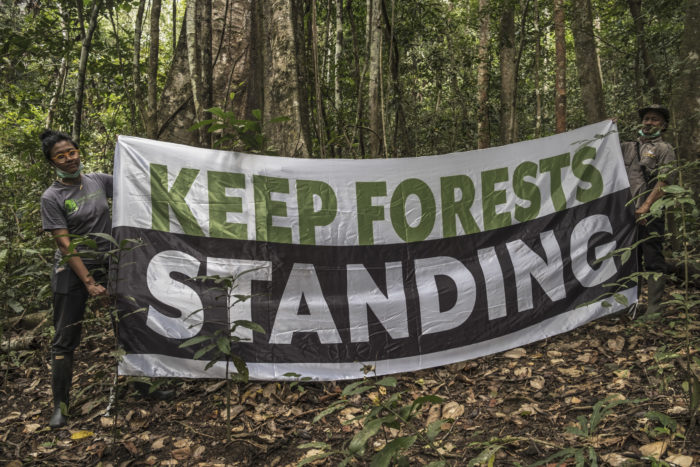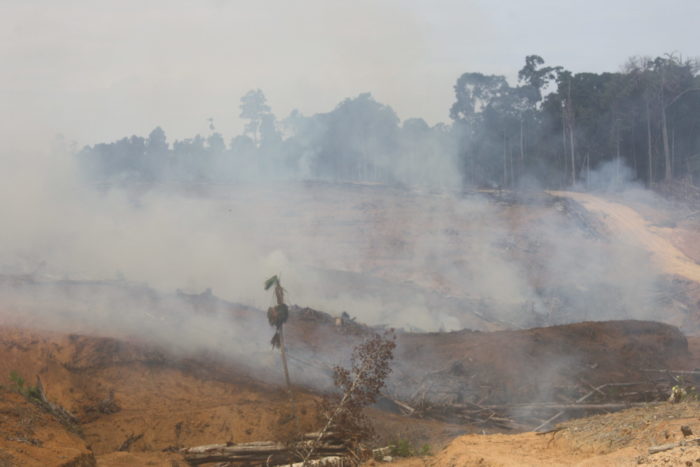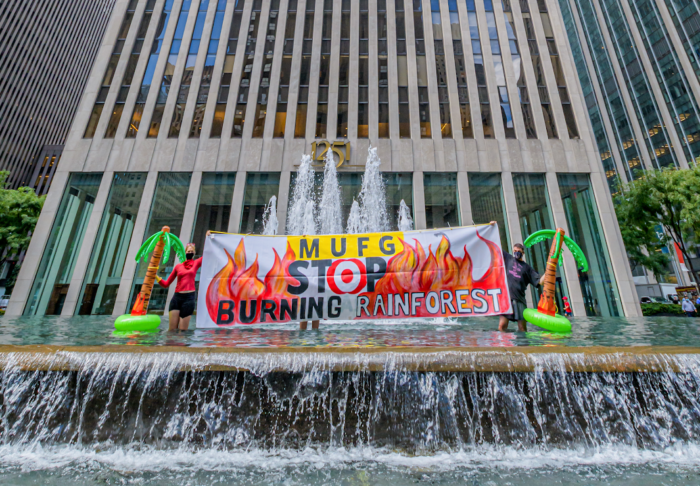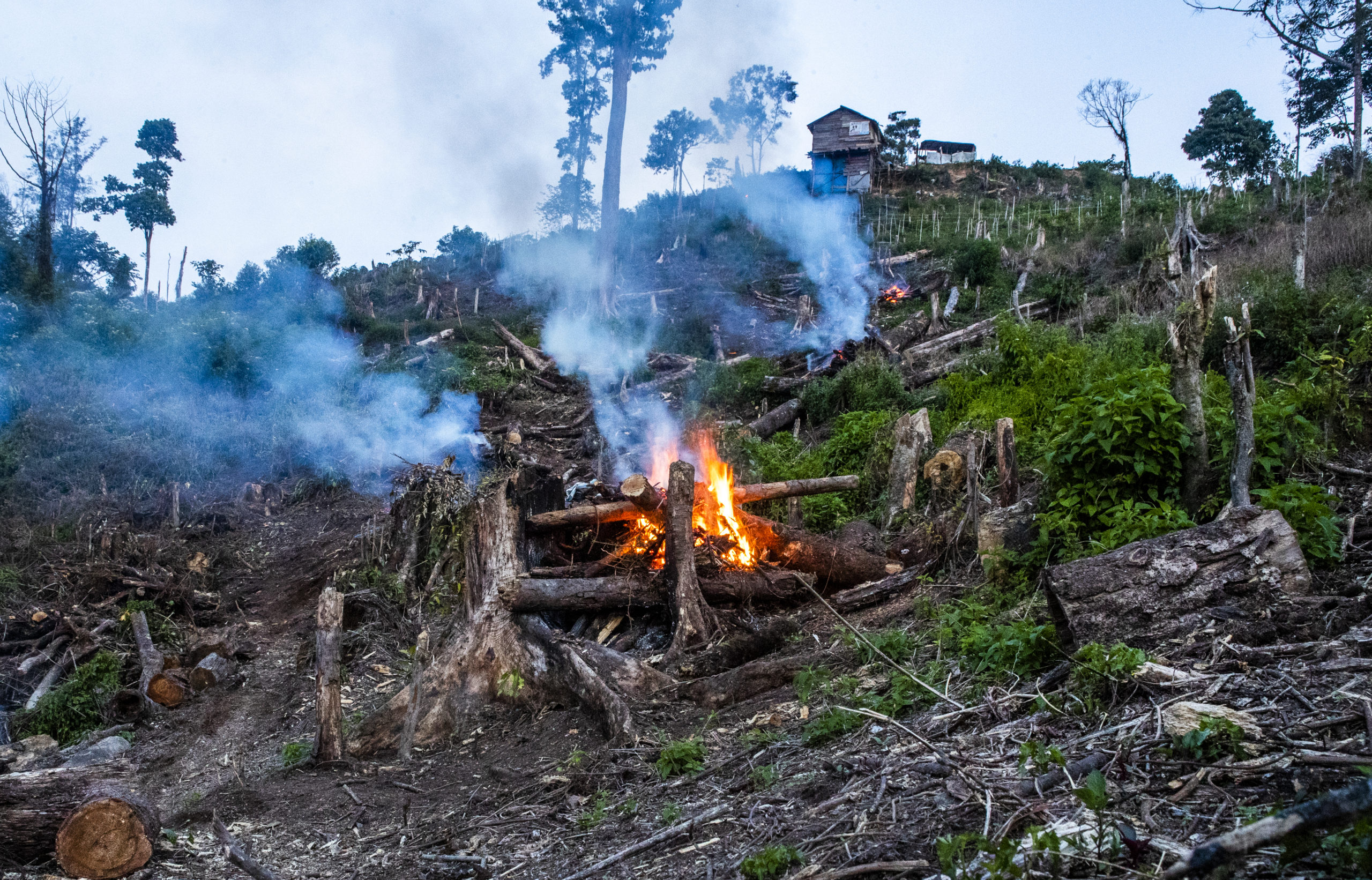Stretching between the hottest months of August to November, fire season grows longer and deadlier each year. These fires are not natural; they are set by agribusiness giants growing palm oil and trees for pulp and paper. Last summer, the world’s last remaining major rainforests in the Amazon, Indonesia, and the Congo Basin burned at unprecedented rates. Fire season is proving to be an annual emergency, spreading illness and disease, destroying homes, habitats, and livelihoods, and propelling us towards climate catastrophe.
Despite this alarming prognosis, corporations continue to intentionally burn tropical rainforests for commodity production. We at Rainforest Action Network say enough —and we’re calling out the banks, brands and businesses driving this destruction.
THE BUSINESS OF BURNING
While wildfires in drier climates can be a natural part of a forest ecosystem, tropical forest fires are anything but. Forests Communication Manager Emma Rae Lierley reveals the true culprit: “Tropical rainforests are being burned every year because it’s the ‘cheapest’ and quickest way to clear land for Big Agribusiness — beef, cattle, soy, palm oil, pulp and paper production.”

In 2020, we launched our latest campaign, Keep Forests Standing, targeting the biggest brands, companies and corporations behind tropical rainforest destruction. Forests are an integral part of a just and stable future — which is why we’re fighting to keep forests standing, worldwide.
Keep Forests Standing
To get involved with our Keep Forests Standing campaign, please visit www.ran.org/keepforestsstanding.
REMEMBERING THE 2019 FIRE SEASON
Each year, fire season wreaks increasing havoc upon the world’s last major rainforests in the Amazon, Indonesia and the Congo Basin.
Last summer, the Amazon fires met global outcry after news outlets reported a 77% increase from 2018. Estimates place total loss at over 906,000 hectares. At the same time, lesser-known fires raged across Indonesia. As of September 2019 roughly 857,756 hectares of Indonesian rainforest burned, releasing 709 million tons of carbon dioxide.
Thanks to your generous support, we’ve been able to provide $400,000 in grants to frontline and Indigenous-led organizations in the Amazon region since last year’s fires. Read more.
This year’s fire season is shaping up to be even more deadly. With COVID-19 disrupting the ability of patrols to monitor forests, illegal land grabs and deforestation rates are soaring. Greater numbers of fires are burning in Amazon and Indonesia than this time last year. In the Brazilian Amazon, satellite data revealed a 28% jump in fires from July 2019 to July 2020. The 2020 fire season has barely begun, and already looks disastrous for the world’s rainforests and our climate.
FORESTS, FIRES AND THE CLIMATE CRISIS
Forests remain our best defense against the climate crisis — yet their blazes push us closer to catastrophe. Emma Rae describes this fatal spiral:
“The destruction of the world’s rainforests is a devastating, self-reinforcing loop: as the forests and carbon-rich peatlands are destroyed, they release an enormous amount of greenhouse gasses into the atmosphere and at the same time destroy the very trees and peatlands that could absorb that carbon and safely store it underground.”
The loss of life-giving forests not only destroy any hope of a stable climate, but accelerate us towards an unlivable future.
PROPELLING PANDEMICS, POISONING COMMUNITIES
The relentless encroachment of human activity into natural ecosystems unleashed the global COVID-19 pandemic. Toxic air pollution from fires choke regions, straining overwhelmed healthcare systems. During the 2019 Indonesian fires, over one million people reported respiratory problems. For communities already grappling with COVID-19, this could be a death sentence.

As the world faces a looming global recession, fires drive greater losses. The World Bank estimates that the economic loss caused by the 2019 fires in Indonesia amounted to $5.2 billion, equivalent to 0.5% of the country’s GDP. For cash-strapped communities fighting COVID-19, this additional threat is devastating.
FOREST + FIRES WEEK OF ACTION

This August, RAN coordinated a Week of Action to take on the Big Business of Burning with a coalition of over 30 organizations calling out some of the main banks and brands that have failed to take action to stop the burning of tropical rainforests. Through a combination of online and offline actions, we turned up the heat on four of the worst financiers: Blackrock, MUFG, BNI, and Santander; and five of the most egregious brands: Procter & Gamble, Mondelez, Mars, Nestle, and Unilever. From an online webinar “rally” to direct actions at headquarter offices, we are committed to exploring new, creative means of defending the world’s last major rainforests that promote public safety during the pandemic.
To learn more or join our next action, please reach out to organizinghelp@ran.org.
You’re reading part of our October Panther eNewsletter! Want to keep reading?
- Launching a New eNewsletter Series
- Organizing During Crisis: RAN continues to Organize for Change
- Chasing Down Chase
- Covid Community Relief Funds
- A look back: Meet the Dynamic Women Leaders Featured in REVEL 2020
